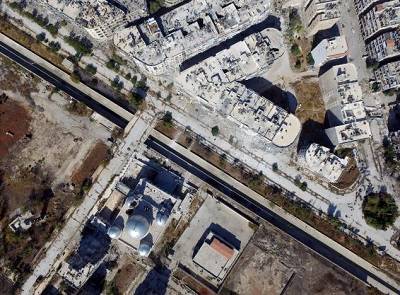Although residents of besieged east Aleppo have been told to leave immediately, they have no safe way of doing so.
Syrian regime forces sent a text message to residents of east Aleppo on Sunday, demanding they leave the opposition-controlled area within 24 hours or risk their lives during a major offensive.
Approximately 250,000 people are believed to be living in besieged east Aleppo, and Syrian regime forces have reversed recent gains opposition made last month in their effort to break the siege.
East Aleppo resident Shamel Mohammad understood the text message loud and clear, but he is not going to leave. "In general, I don't want to leave. I just want the supply route to open, for food and aid to return to the city, and to go back to how things were before the siege," said Mohammad, who sells stationery.
Other residents of east Aleppo, although they have already stayed through five years of war, now want to leave owing to the current conditions. "Of course, I want to get out," Fatima Lababidi, a schoolteacher and mother of four, told Al Jazeera. Both she and Mohammad live near the dividing line between regime- and opposition-held areas in Aleppo, near the citadel.
But whether or not they want to leave, many agree that leaving is nearly impossible. "There's no way out. The regime doesn't open the route for us and doesn't stop bombing," said Lababidi.
Despite deteriorating conditions and dwindling food supplies, Mohammad said: "I don't want to move away. My biggest dream is we return to the security and safety of six years ago … that we may eat and drink and live a little."
According to Mohammad, opening a supply route to east Aleppo by linking it to opposition territory west of the city, not migration, will accomplish this. "The last time the route at Ramouseh [military academy] was opened, people died there but aid could get in."
Small amounts of aid from other parts of Syria reached east Aleppo when opposition groups took the Ramouseh military academy in August.
Conditions are getting worse in east Aleppo, according to many observers. "Electricity is always cut off, [there's a] high increase in prices, and an acute lack of vegetable availability, fuel is almost non-existent in markets, the bread quality and quantity is abating," Humam al-Malah, a member of the Syrian Network for Human Rights, in the Aleppo governorate, told Al Jazeera.
"Maybe the most difficult obstacle is the lack of stored fuels that is required for the generators."
Late last week, the UN warned that east Aleppo risks mass starvation if food is not allowed in immediately, and pleaded that the Syrian regime, Russia, and opposition groups permit food to be delivered.
"From what I've seen, the regime is the one attacking the people here," said Lababidi, when asked about reports of attacks against people trying to flee east Aleppo. She said leaving is impossible due to the regime-imposed siege and the general violence: "There's no way out. All the routes are closed and there are battles all around the city."
Some observers, such as al-Malah, are skeptical about the routes that the regime says exist for people to leave. "From our point of view, it is only to deceive the public, because the crossings are monitored by the regime's snipers, and any attempt by anyone to cross it might lead to them being shot," he said.
"The people also fear crossing to the regime territory as it might lead to their arrest, especially without international parties guaranteeing their safety."
Until the situation changes in east Aleppo, Mohammad waits. "The worst part of it all is that no one cares or pays attention to our suffering, death, agony or starving," he said. "If things ease up, only God knows."
PHOTO CAPTION
A general view taken with a drone shows a road separating Aleppo's regime-controlled areas from the opposition-held ones in Syria October 20, 2016. REUTERS
Source: Aljazeera.com


 Home
Home Discover Islam
Discover Islam Quran Recitations
Quran Recitations Lectures
Lectures
 Fatwa
Fatwa Articles
Articles Fiqh
Fiqh E-Books
E-Books Boys & Girls
Boys & Girls  Hajj Rulings
Hajj Rulings Hajj Fatwas
Hajj Fatwas














